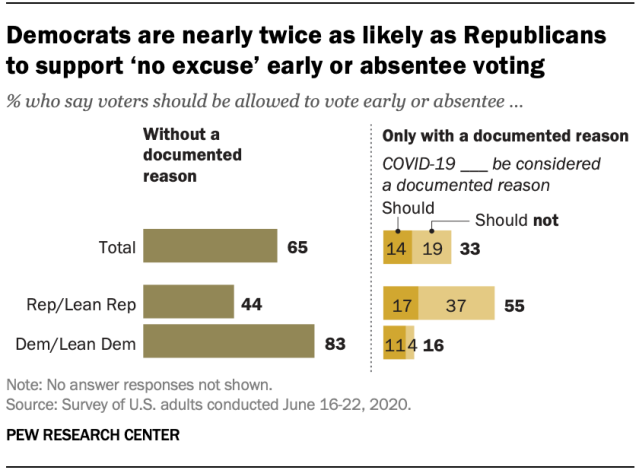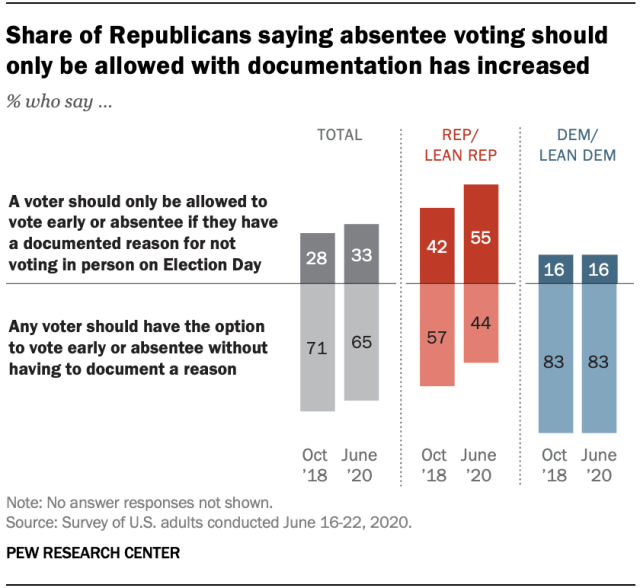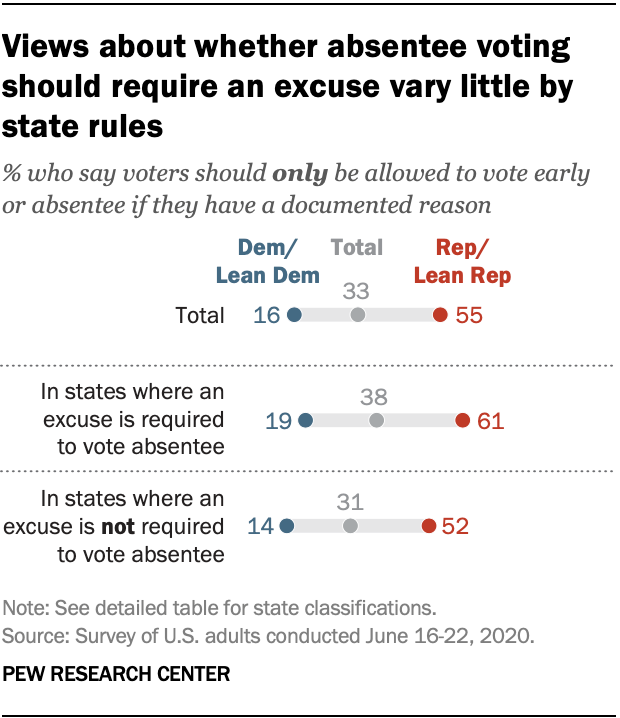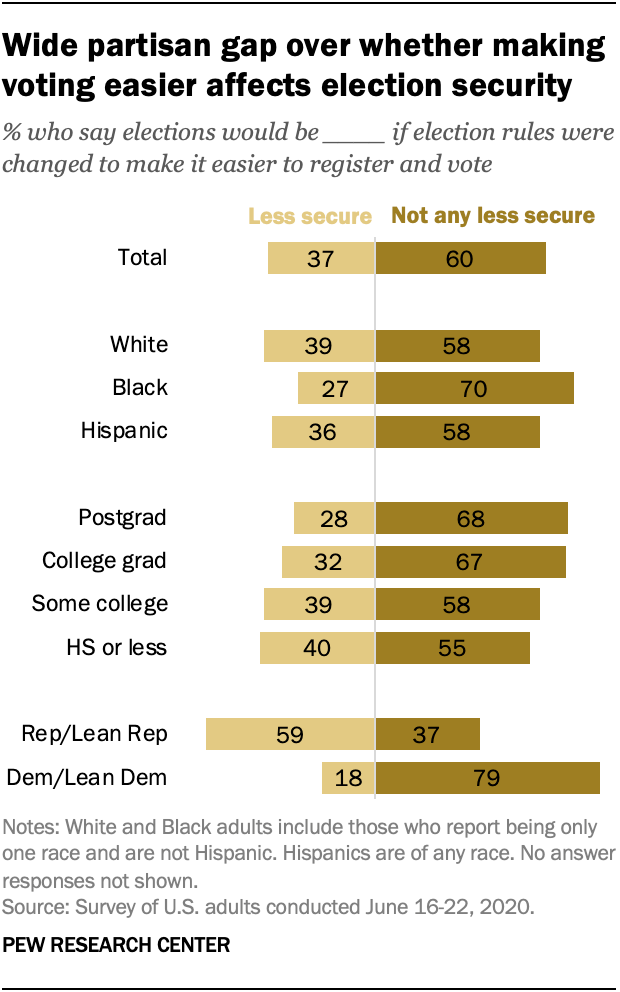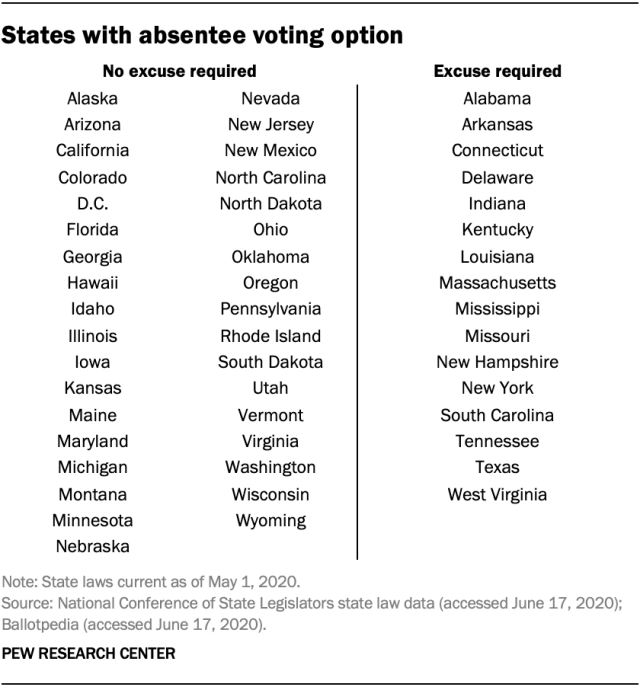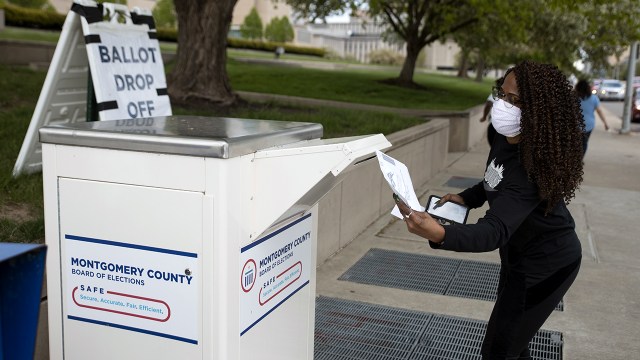
The prospect of conducting the presidential election during a pandemic has prompted many states to reexamine their plans for how to conduct the election safely, including when it comes to access to early or absentee voting.
About two-thirds of Americans (65%) say the option to vote early or absentee should be available to any voter without requiring a documented reason, while a third say early and absentee voting should only be allowed with a reason, according to a Pew Research Center survey conducted June 16-22.
Those who say documentation should be required for absentee voting were asked if COVID-19 should be considered a documented reason. Among the public overall, 19% say documentation should be required but COVID-19 should not be a valid reason; 14% say documented reasons should be required and COVID-19 should be one of them.
Pew Research Center conducted this study to understand how Americans think about absentee voting and voting policy in the country today. For this study, we surveyed 4,708 U.S. adults in June 2020. All participants of the study are members of the American Trends Panel (ATP), an online survey panel that Pew Research Center recruits through national, random sampling of residential addresses. All U.S. adults have a chance to be selected to participate in the survey. The survey is weighted to be representative of the U.S. adult population by gender, race, ethnicity, partisan affiliation, education and other categories. Read more about the ATP’s methodology.
For analysis on state voting policy, we used data available through Ballotpedia, accessed June 17, 2020.
Here are the questions asked for this report, along with responses, and its methodology.
Democrats and Democratic-leaning independents overwhelmingly support so-called “no excuse” early or absentee voting: 83% say this. Among the small share of Democrats who do not, most say the coronavirus outbreak should qualify as a documented reason.
GOP views are more divided: 44% of Republicans and Republican leaners say no documented reason should be necessary to vote early or absentee, while 55% say one should be. Among Republicans who say a documented reason is needed, most say the coronavirus outbreak should not be considered a valid reason: 37% of all Republicans say early and absentee voting only should be allowed with a documented reason and say that COVID-19 is not an acceptable reason; 17% say a documented reason should be required, but that COVID-19 should be a valid reason.
Americans’ support for no-excuse absentee voting has decreased modestly from 71% in October 2018 to 65% today – a result of shifting views among Republicans. Today, a 55% majority of Republicans say voters should only be allowed to vote early or absentee if they have a documented reason for not voting on Election Day, up from 42% who said this in 2018.
The views of Democrats are little changed over this period.
Americans’ attitudes about no-excuse early or absentee voting differ only modestly by the current policies of their state. Those living in states that require a documented reason are somewhat more likely than those in states without such a requirement to say voters should have to provide a reason for voting early or absentee (38% vs. 31%, respectively). However, these differences are much more modest than the differences between partisans, even in states with similar absentee voting policies.
Wide partisan divide over whether changing rules makes elections less secure
In the Center’s June survey, 60% of Americans say that changing election rules to make it easier to register and vote would not make elections any less secure, while 37% say that elections would be less secure if it were easier to register and vote. These views are little changed from 2018.
Majorities of Black, white and Hispanic Americans hold the view that making it easier to vote would not make elections any less secure, but Black Americans are especially likely to say this (70% vs. 58% among both white and Hispanic Americans).
However, there is a stark partisan divide in these views: Nearly eight-in-ten Democrats (79%) say that changes to election rules to make it easier to register and vote would not make elections any less secure, while 59% of Republicans say they would.
Note: Here are the questions asked for this report, along with responses, and its methodology.



